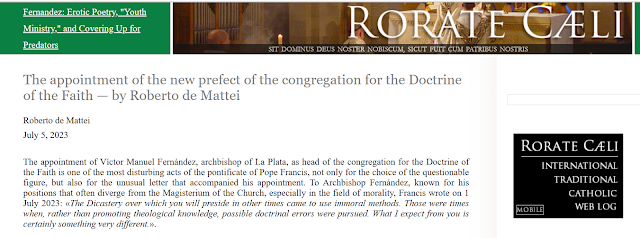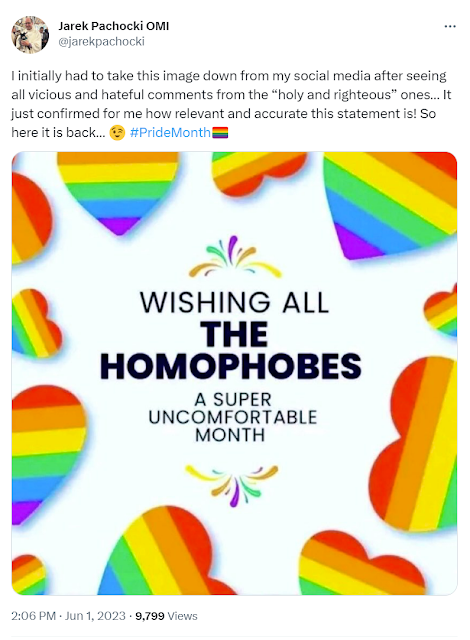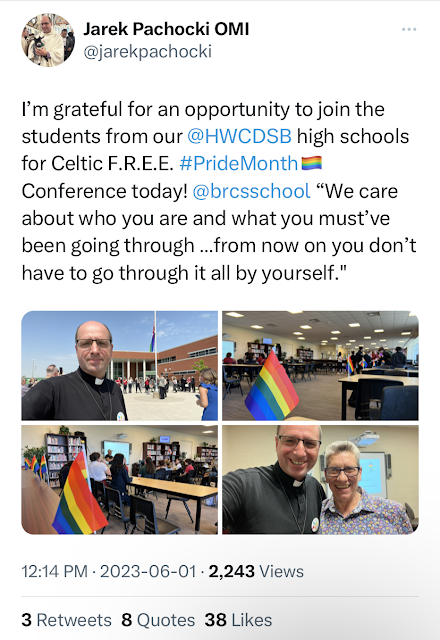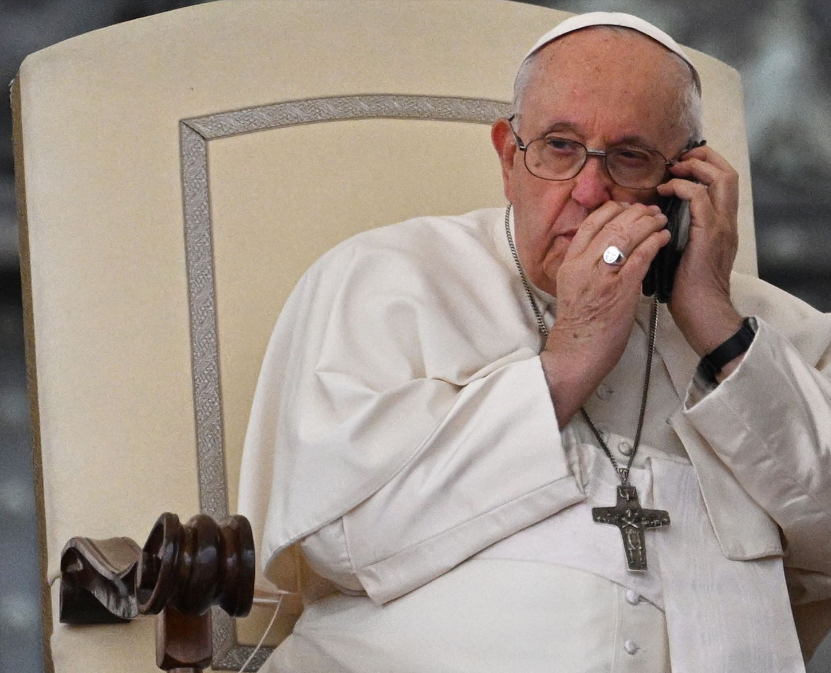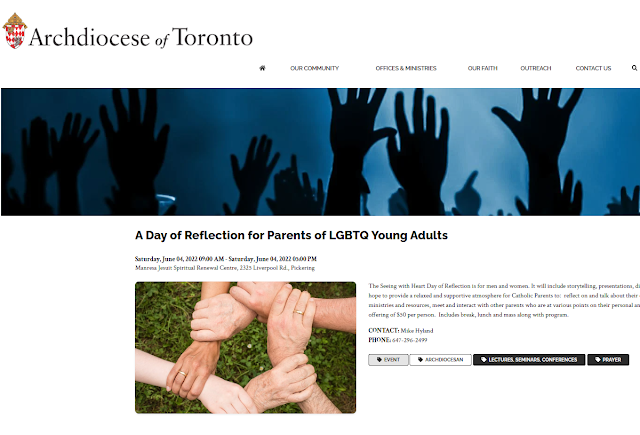From La Plata to Rome. Francis rewarded Tucho Fernandez, a cover-up of pedophiles, with a central position in the Vatican
To confirm that his papacy is an accumulation of pure gestures, Bergoglio puts a bishop of his confidence as Prefect for the Doctrine of the Faith (the old Inquisition), the position occupied, among others, by Ratzinger before becoming pope. As archbishop of La Plata, Fernández was noted for disparaging victims and covering up for abusers.
The Italy correspondent for the conservative Argentine daily La Nación on Saturday called it a "bombshell news" and an "unexpected designation." It probably is for those who align themselves with the most reactionary, ultra-medieval and most obscurantist sectors (in short, they all are) of the Roman curia. But considering the moves made by Jorge "Francisco" Bergoglio in recent years, it shouldn't come as much of a surprise.
The news in question is that the Vatican has just published in its Official Gazette that the archbishop of La Plata Víctor Manuel "Tucho" Fernández was elected by the new pope "prefect of the Dicastery for the Doctrine of the Faith", as reported in the bulletin of the so-called Holy See. Fernández would take office in September, replacing Cardinal Luis Francisco Ladaria Ferrer.
The Dicastery is the direct successor of the Holy Roman and Universal Inquisition created in 1542 by Paul III and whose legacy for humanity was to have watered part of the world with blood with its hunts for "witches", torture and humiliation of "heretics" and other bloodthirsty methods to control the wayward population with the "apostolic and Roman Catholic doctrine". Among some of its milestones, the Inquisition tried and condemned Galileo Galilei for his heretical theories.
It may interest you: Some of the cruelest tortures of the Holy Inquisition
It may interest you: Some of the cruelest tortures of the Holy Inquisition
Although modern inquisitors no longer send their executioners to extirpate satanic confessions under torture or burn women in bonfires mounted in public squares (that today is done more civilly by States and their governments) it is still the "ministry" of the Vatican that controls, censors and sanctions everything related to the "values" of official Catholicism. This includes the systematic plan to cover up thousands and thousands of rapes of children and adolescents in schools, institutes and parishes around the world.
Precisely, Tucho Fernández is a specialist, among other things, in guaranteeing this systematic cover-up while issuing communiqués and blocking homilies in which, as Bergoglio commands, the abuses committed by his cassocks employees are culpably condemned. The few who manage to break the silence of the ecclesiastical walls and jump to public opinion, of course.Very valuable task
The Official Vatican Bulletin publishes a letter that Francis sends to Tucho. There he says that he entrusts to him a "very valuable" task, such as "guarding the teaching that springs from faith to 'give a reason for our hope, but not as enemies who point and condemn.'" As if to "clarify," the pope acknowledges that the Dicastery "in other times came to use immoral methods" and that "these were times when, rather than promoting theological knowledge, possible doctrinal errors were pursued. What I expect from you is certainly something very different," he tells his handler.
See also: Jorge "Francisco" Bergoglio: ten years of a papacy where hypocrisy is divine
See also: Jorge "Francisco" Bergoglio: ten years of a papacy where hypocrisy is divine
Curiously, the Roman monarch makes explicit the intention of freeing the new prefect from having to take charge of "attending" to the complaints of sexual abuse that arrive in Rome. "Given that for disciplinary matters – especially related to the abuse of minors – a specific Section has recently been created with very competent professionals, I ask you as Prefect to dedicate your personal commitment more directly to the main purpose of the Dicastery, which is to 'keep the faith'", he orders.
Strictly speaking, this new "section" of which he speaks is an office dedicated to receiving the handful of "officialized" complaints against bishops, priests and nuns that dioceses around the world consider that the Vatican should "investigate" and "give sentence." But it is an office that answers directly to the Dicastery that Fernández will lead shortly. Pure story.
Moving tiles
The pope's move seems to be in line with others in recent years in which the Argentine supreme pontiff was placing in key places in the Vatican men of his confidence who, in addition, adhere to his "theology of the people" (doctrinal aspect that, appealing to populist topics, aesthetically distances itself from the most ultraconservative sectors of the Church). Aware that his health declines with the passage of time, the so-called "Peronist pope" is already planning his succession by filling St. Peter's Square with an addicted civil servant.
The most emblematic case is that of the former bishop of Oran, Salta, Gustavo Zanchetta, Bergoglio's extremely trusted man. Between December 2018, when allegations against him of two abused seminarians (the victims could have been many more) and March 2022, when he was sentenced to four and a half years in prison; the merciful pope sought to "save" Zanchetta by placing him in charge of the Administration of the Patrimony of the Apostolic See.
Better known as the Vatican's "real estate," the office handles more than five thousand properties worldwide with an estimated value of $3 billion. Finally, Zanchetta had to return to Argentina to undergo the trial. Of course, today he enjoys a house arrest that is denied to any Christian for much less serious crimes.
See also: Salta: priest friend of Zanchetta accused of sexual abuse also goes to trial
See also: Salta: priest friend of Zanchetta accused of sexual abuse also goes to trial
So far it is unknown if Tucho Fernández directly abused minors, seminarians or students of the Argentine Catholic University when he was its rector. What is known is that in recent years he was responsible for covering up any stray sheep that was denounced for these crimes, doubly aggravated because they were representatives of a religious cult (with the level of vulnerability of the victim that this implies).
In a special report published by La Izquierda Diario last December (carried out together with Pulso Noticias), eleven of the cases reported so far in La Plata are detailed and in which, in various ways, "Tucho" played a clear role of covering up his priests. A cover-up that goes hand in hand with dehumanization and contempt for victims and survivors.
The cases are those of the former chaplain general of the Buenos Aires Penitentiary Service Eduardo Lorenzo (committed suicide in December 2019 in a Caritas headquarters minutes after being arrested), the creator of the Miles Christi congregation Roberto Yanuzzi (the only one excommunicated by the pope, although for his doctrinal differences and not for his abuses), Héctor Giménez (denounced but unpunished), Rubén Marchioni (publicly denounced but not judicially), Maximiliano Di Virgilio (the family of his victim withdrew a criminal complaint), the former chaplain of the Gendarmerie in Misiones Raúl Sidders (with an absurd house arrest and close to an oral trial) and five former capos of the Provolo Institute of La Plata (Nicola Corradi, Horacio Corbacho, Giuseppe Spinelli, Giovanni Granuzzo and Eliseo Primati).
Along with Fernández, in almost all these cases the auxiliary bishop of La Plata, Alberto Bochatey, a servant formed by the ultra-reactionary Héctor Aguer, predecessor of "Tucho", played a central role in the cover-up plans. Although there are no known allegations about him and despite the "enmity" between Bergoglio and Aguer, in 2017 the pope appointed Bochatey "apostolic commissioner" to investigate allegations of sexual abuse at the headquarters of the Provolo Institute in Mendoza. Obviously he did not investigate anything and much less collaborated in the judicial case that ended up condemning Corradi and Corbacho to almost fifty years in prison.
"Tucho" and Bochatey, among other aberrations, organized the "homage mass" (and body present) to the suicide Lorenzo in the same parish of Gonnet in which the priest, for years, abused teenagers whom he corrupted and extorted to satisfy his desires for oppression.
Nothing less could be expected from the pope himself. In addition to having been an accomplice of several crimes of the last civic-military-ecclesiastical dictatorship (when he already had a high position in the Argentine Curia), in his country he has spent years protecting criminals of the stature of Julio Grassi, Zanchetta, Justo Illaraz, Agustín Rosa Torino and dozens of priests and bishops with canonical investigations that only gave impunity. With the exception of the mafioso Yanuzzi, not even the few priests convicted criminally were expelled from the Church.
See also: The Archbishopric of La Plata put a priest facho to attend health centers
See also: The Archbishopric of La Plata put a priest facho to attend health centers
Cuadrazo
Another characteristic of Víctor Fernández is his vocation to "mediate" in social conflicts, when they threaten the political power of the day. For example, in 2018 he came to the aid of the then governor María Eugenia Vidal when hundreds of workers left from the entrances of the Río Santiago de Ensenada Shipyard to occupy the headquarters of the Ministry of Economy in La Plata in repudiation of the adjustment and delivery plans of the company by the management of Cambiemos. To this end, the archbishop devised a demobilizing maneuver together with part of the union leadership of the region that endorsed (by action or omission) Vidal's plans.
Now, after five years "cleaning" (based on liturgical cosmetics and silences bought at a good price) the archdiocese of La Plata of the ultraconservative remnants that Aguer had left, "Tucho" has to transfer part of his experience to the Vatican.
Of course, to occupy a position that intellectuals such as Joseph Ratzinger once held, Fernández does not lack a curriculum. He will become prefect for the Doctrine of the Faith after having been dean of the Faculty of Theology of Buenos Aires, president of the Argentine Society of Theology and of the Commission of Faith and Culture of the Argentine Episcopate. And before assuming the Archbishopric of La Plata, he was rector of the Pontifical Catholic University of Argentina. What is said is a true picture for all the needs and urgencies that the Vatican has in its particular Bergoglian stage.










